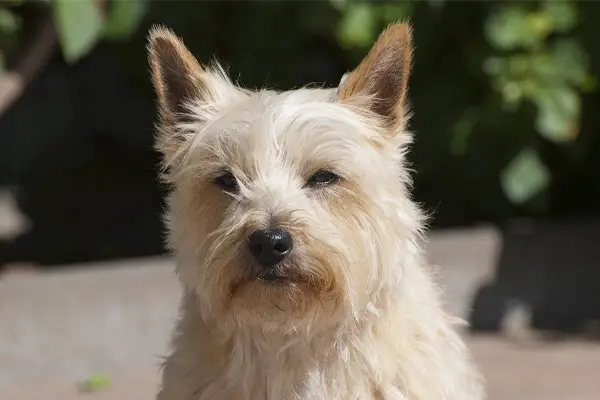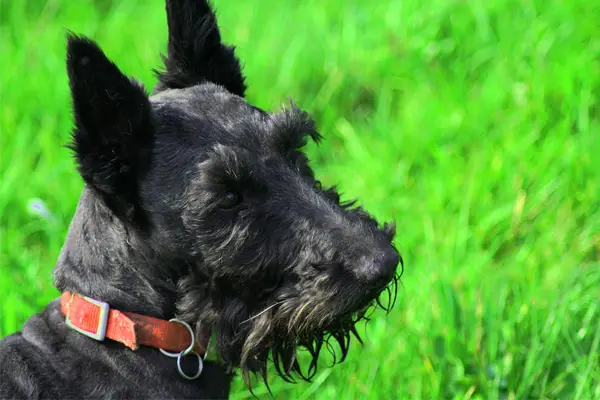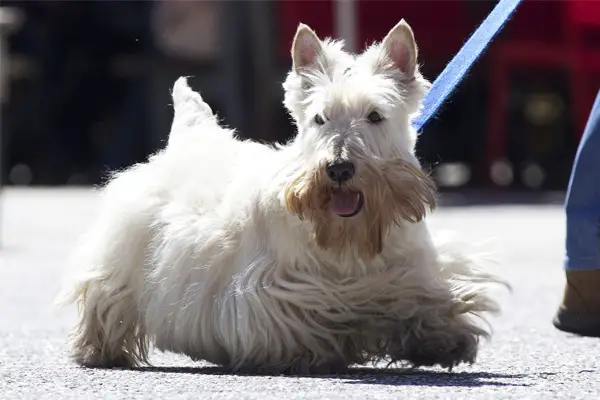Scottish Terriers are a group of small dogs that stands about 10 inches tall. The Scottish Terrier is known for its distinctive beard that accents the muzzle. Their small bodies are covered with a wiry topcoat that comes in black, wheaten yellow, or a brindle-stripe pattern. And just like most terriers, they have bright eyes and erect ears signifying alertness.
Scottish Terriers make excellent family dogs. But they may not be an excellent fit for anyone, especially those with younger children. They also need someone who can pay attention to them, and most are one-person dogs.

Scottish Terrier Statistics
| Dog Breed Group | Terrier |
| Breed Size | Small |
| Height | 10 inches |
| Weight | 19-22 pounds (male); 18-21 pounds (female) |
| Lifespan | 12 years |
Scottish Terrier Ratings
| Energy level | |
| Exercise needs | |
| Requires attention | |
| Playfulness | |
| Trainability | |
| Shedding | |
| Grooming | |
| Friendly with family | |
| Friendly with kids | |
| Friendly with strangers | |
| Friendly with other dogs | |
| Prey Drive |
Scottish Terrier History
As their name implies, Scottish Terriers originated in Aberdeen Scotland, where they were called Aberdeen terriers. They are believed to have been developed in the 1700s when James I of England sent several dogs as a gift to the French monarch. These dogs were then used as the foundation of the Scottish Terriers.
Scotties during these times still belong to only one group, and it wasn’t until the 1800s when the country decided to separate the dog breed into two groups.
By 1882, the first Scottish Terrier Club was formed, and the dogs were brought to the United States the following year. Their popularity rose in the US when former President Roosevelt owned a Scottish Terrier named Fala.

Scottish Terrier Temperament
Scottish Terriers are generally confident, independent, and spirited. According to the American Kennel Club, they are dogs that represent power in a small package.
Although playful and friendly as a puppy, Scottish Terriers’ behavior changes a lot as they mature. They are not extremely playful but are rather serious dogs. They take pride in their dignity, and they’re most of the time reserved. As others would call it, they can become moody.
Scottish Terriers are good with their families, but most of the time, they only stick to one person. They are not an excellent fit for people with small children as they tend to snap at them. With older children, however, they can get along if treated respectfully.
These dogs are known to be aloof to strangers and can be aggressive with other pets. Early socialization is needed if you want them to be well-rounded.
When they’re out to play, they might not respond over calls. They can also be hard to train because of their independent tendencies. Consistent and firm leadership is essential for these dogs. They’d respond well though with food and praises.
Scottish Terrier Care Requirements
- Nutrition: Scottish Terriers need high-quality food with all the essential nutrients to support their high energy. It must contain protein, carbohydrates, fats, vitamins, and minerals. For protein, you can get these from high-quality animal meat. You can mix some brown rice in there for some carbohydrate source. And you can add some vegetables and fruits for some sources of fiber too. Watch the dog’s calorie intake if you don’t want them to get overweight. Of course, this should depend on their activity level, age, and metabolism.
- Grooming: Scottish Terriers have wiry, long coats that shed occasionally. However, regular grooming is essential to keep their coat healthy. It’s also best in removing mats and tangles, and of course, dead hair that can go to your floor and furniture. Scottish Terriers also need to have their coats hand stripped, especially when they’re young. It should be done once a month, or weekly at best. This way, you’ll make things easier for your groomer. Get their coats clipped at least every 6-8 weeks. You can give your Scottish Terriers an occasional bath, too. And don’t forget to keep their nails short to keep them comfortable.
- Exercise: As high energy dogs, Scottish Terriers need at least a daily walk to keep their energy at bay. You can also create some activities that you can do together like fetch, tug, and more that will get them going. They make great dogs for a small home or apartment living.
- Health: Scottish Terrier is a generally healthy breed, but they are also prone to some health issues. Some of the health conditions you need to watch out are allergies, Cushing’s disease, digestive issues, epilepsy, hypothyroidism, and muscle cramps. This is why it’s essential to watch what he eats and give him the right amount of exercise.
- Lifespan: The life expectancy of Scottish Terriers is 12 years.

Famous Scottish Terriers
- Fala: A Scottie owned by President Roosevelt
- Laddie: The most favorite Scottish Terrier of Queen Victoria
- Stuka: The mascot of a daredevil group of American flyers of Memphis Belle
- Telek: The Scottish Terrier of President Dwight Eisenhower
- Barney: The first dog of the United States owned by Laura and George Bush
- Titus: The Scottie of Poland’s President, Lech Kaczynski
- Splinter II: The mother of the Scottish Terrier breed
- Jock: The Scottish Terrier from the movie Lady and the Tramp
Fun Facts About Scottish Terriers
- Scottish Terriers were originally used as ratters.
- Royalties love them. King James VI and Queen Victoria owned some Scotties.
- A Scottish Terrier is one of the most loved game pieces in the monopoly board game.
- This dog breed is the second to have the most wins in the Westminster Dog Show.
- They were originally named Aberdeen Terrier.
- Three Presidents have lived with Scottish Terriers in the White House.
- They are diggers.
Check Out Other Terrier Dog Breeds:
Airedale Terrier, American Hairless Terrier, American Staffordshire Terrier, Australian Terrier, Bedlington Terrier, Border Terrier, Bull Terrier, Cairn Terrier, Cesky Terrier, Dandie Dinmont Terriers, Glen of Imaal Terriers, Irish Terrier, Kerry Blue Terrier, Lakeland Terrier, Manchester Terrier, Miniature Bull Terrier, Miniature Schnauzer, Norfolk Terrier, Norwich Terrier, Parson Russell Terrier, Rat Terrier, Russell Terrier, Sealyham Terriers, Skye Terrier, Smooth Fox Terrier, Soft Coated Wheaten Terrier, Staffordshire Bull Terrier, Welsh Terrier, West Highland White Terrier, Wire Fox Terrier
